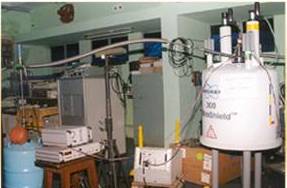Nuclear Magnetic Resonance
Members: Prof A.Ghoshray, Prof. K.Ghoshray , Dr. B.Bandyopadhyay
Activity:Electronic properties of metal-hydrogen systems, dense Kondo systems, topologically frustrated systems, magnetic oxides, and metallic multilayers prepared by electro deposition are studied by cw and pulsed NMR measurements. NMR spectroscopy deals with the atomic nuclei responding to the radio frequencies. The same spectroscopic technique has now evolved into Magnetic Resonance Imaging (MRI). The response of the nuclei to a radio-frequency excitation is determined by their electronic and magnetic interaction with the surroundings in a molecule or a crystal, experienced at the microscopic level. In metallic and non-metallic solids, large and inhomogeneous nuclear-lattice interactions, necessitates the observation of resonance over a large frequency domain. Such type of experiments is known as wide line NMR spectroscopy. The only facility of wide line NMR spectroscopy in India is maintained by SINP. However, this has always been a significant tool in Condensed Matter Physics experiments. All the recently discovered novel materials, such as, high temperature superconductors, organic superconductors, giant magneto-resistive materials, etc., have been extensively studied by NMR, and valuable information about the microscopic mechanisms involved in various material properties have been obtained
 |
Principle equipment: Pulsed NMR Spectrometer Equipped with :
|